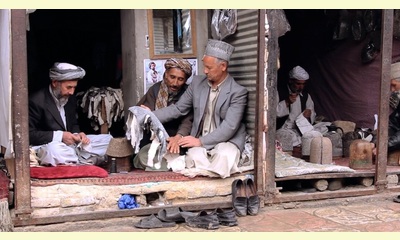|
|
Tackling Economic Poverty in Afghanistan
un articulo por Maseehullah Stanikzai
Almost 60% of the Afghanistan populations are living on less than $1.25 per day. Many children are sent outside for doing physical works by their family in order to earn money where-as by age they deserve to get education. Unemployment is rapidly increasing in the country every day which reflects the security in the country. At the same time there are several policies created by the government, civil society and other organizations to tackle this issue. Poverty reduction is at the core of Afghanistan’s National Development Strategy (ANDS) approved by the government of Afghanistan in 2008. ANDS serves as Afghanistan poverty reduction paper, ensure sustainable development, through a private sector led-market economy, improve human development indicators and make significance progress towards development. The ANDS Oversight Committee (OSC) was mandated by the Government to produce a Millennium Development Goals-based national strategy that is Afghan-owned and meets the requirements for a Poverty Reduction Strategy Paper. The OSC met on a regular basis to design, discuss and oversee the development of the strategy, including the identification of the needs and grievances of the people, and the prioritization of resource allocations and actions. 
click on photo to enlarge
Two initiatives in Afghanistan are following the right way to tackle the issue of poverty because they are addressing youths. Both the initiatives are created by the Deputy Ministry of Youths Affairs of Afghanistan with support from the international organizations such as UNICEF and UNFPA. One project is named engaging youths in trade, while another project is titled national youths policy .
In my opinion youth are playing dominant role in the sustainable development of any country including Afghanistan. One of the major source of poverty in unemployment in Afghanistan as it is revealed in a survey conducted by the Asia Foundation in Afghanistan in 2012. Definitely, both the initiatives by the deputy ministry of youth affairs, UNFPA and UNICEF will have its impact on reducing poverty.
Poverty has contributed on many other problems in the country. For instance, corruption, addiction, maternal mortality, insecurity, education and other human rights related issues.
There are many reasons for the existence of poverty in Afghanistan. Thirty years of war destroyed the foundation of development in Afghanistan. Afghan people became hopeless about the future of their country, communities started fighting among themselves, and a pessimistic view of life become prevalent throughout the country.
Considering the above two initiatives, Afghan government, civil society and international community should establish more micro finance programs, particularly for youth and women, to encourage small business start-up. I recommend the government, universities and private business in Afghanistan encourage youth to invest; provide or subsidize loans to youths to pursue their economic programs (ideas); spread the culture of innovation; and establish national programs to boost employment.
|








|
DISCUSSION
Pregunta(s) relacionada(s) al artículo :
Can UN agencies help eradicate poverty in the world? ,
* * * * *
Comentario más reciente:
:
for an updated listing, click here
This discussion question applies to the following articles:
The Hungry Know No Peace
Report on the UN Millennium Development Goals: we can eliminate world poverty by 2030
Tackling Economic Poverty in Afghanistan
Oxfam agrees with IMF on 'Redistribution, Inequality, and Growth'
WFP Launches Major Study Into Brazil's Success In Buying From Smallholder Farmers
ONU: Líderes mundiales logran consenso sobre la nueva Agenda para el Desarrollo Sostenible
Les Etats membres de l’ONU s’accordent sur le nouveau programme de développement
UN: Consensus Reached on New Sustainable Development Agenda to be adopted by World Leaders in September
Developing Nations Seek Tax Body to Curb Illicit Financial Flows

|
|









